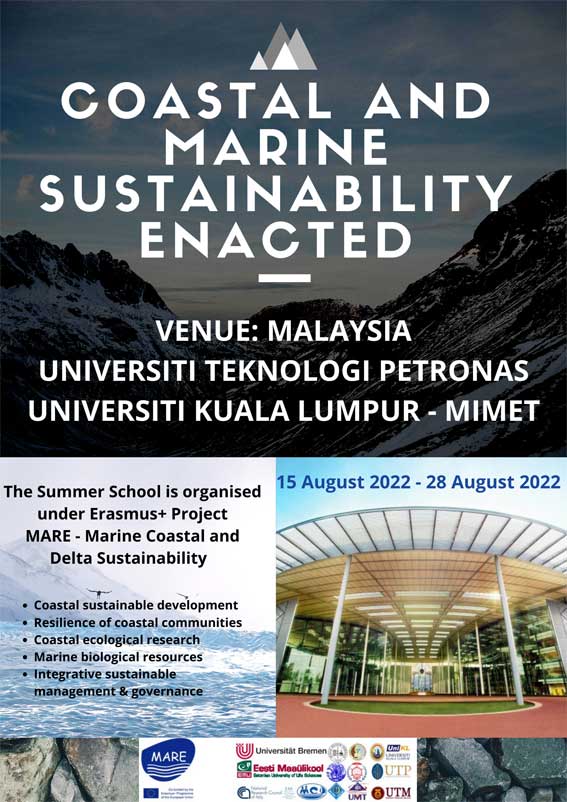Meeting of MARE Vietnam partners and some stakeholders discussing SCP
A meeting was organised on July 26, 2022 between the Vietnamese partners of the Marine Coastal and Delta Sustainability for Southeast Asia (MARE) Project to discuss linking MARE activities and resources with relevant academic & non-academic organisations involving employers. The meeting was organized in the MCD office in Hanoi, with the participants in-person from MCD, HCMUNRE, CTU, VNIO and virtual participation of VMU representative. The meeting was also attended by guest participants from the University of Toronto (Canada) and VISI.
Meeting Report 26 Jul 2022
Session at Ecosystem Service Partnership Conference, 10-14 October, 2022 in Crete.
https://www.espconference.org/europe22
ESP_Session_Book of Abstracts
The proposal of a session “Sustainable spatial planning and management of ecosystem services in coastal areas and marine regions” has been submitted by Dr. Daniele La Rosa (University of Catania, Italy) and Dr. Vincenzo Maccarrone (National Research Council, Italy) and approved by the Scientific Committee of the Conference
ESP conferences represent the most relevant scientific event related to Ecosystem Services topics, gathering around 500-600 scholars and researcher from all Europe.
The session will host contributions from Partner of Mare of Vietnam and Malesia (contributions to be defined in July-august) and will be a great chance to fertilise the MARE research framework with other scholars.
Title Sustainable spatial planning and management of ecosystem services in coastal areas and marine regions
Abstract
There is an increasing concern on exposure and vulnerability of coastal ecosystems to different drivers of changes (e.g. ocean acidification, chemical & waste pollution, overexploitation of fish stocks). The areas on the interface between land and sea, such as coastal zones & deltas, represent a difficult environmental governance challenge, as they concentrate globally over 90% of population greatly relying on marine resources, however vulnerable to sea level raise & and deterioration of marine environments.
Especially in developing countries, such areas bear the price of a fast economic growth, and themselves provide major contribution to ocean pollution, while coastal ecosystems provide barrier, regulation & water purification functions, such as wetlands & mangroves are under the threat of extinction.
Coastal ecosystems provide the complete range ecosystem services on which coastal communities depend for food, economic activities, and cultural enrichment, but at same time represent arenas of strong interests, which often generate relevant trade-offs.
Local issues such as pollution, overfishing and environmental degradation in the coastal zone require immediate action to guarantee the integrity of coastal ecosystem services. Moreover, basic challenges, such as lack of monitoring effort, lack of information and use conflicts, must be overcome in coastal management strategies.
Coastal management is beginning to encompass more integrated strategies, but more holistic and transdisciplinary strategies are also necessary. The ecosystem services approach is a participative and iterative process, which seeks to improve decision-making over a particular issue, with a variety of measurement units (biophysical, monetary or non-monetary) depending on each case, and recognizes that the context in which the environmental assessment is included is important, as well as the demand for services.
Changing the current scenario is a difficult process, which includes changes in current public policies, public awareness and repeatedly producing results that support decisions. However, important first steps have already been taken through simple spatial and quantitative tools, providing clear tools that can be used by decision makers. However, such instruments and methods are required to be tested on the ground.
The scale of these problems urgently calls for research on methods and theoretical approaches that require contamination different disciplines such as ecology, engineering, planning, economy to detect risks and weaknesses of coastal ecosystems. (E)valuation allows the quantitative assessment of different options for planning and management of coastal zones to be implemented by making market and non-market goods and services comparable. Of particular relevance is the valuation of non-market services by coastal ecosystems.
A better understanding about how socio-economic factors interact with coastal ecosystem services will allow to better shape planning decisions and management options to adapt to future global and local changes of coastal ecosystems.
Goals and objectives of the session
This session aims to present current researches related to planning and management of coastal ecosystem services. Possible topics and research questions include:
– how planning of human activities in coastal areas can maximize the overall provision of ES?
– which are the main trade-offs generated by different planning and management options?
– Is it possible thinking to measure environmental performance using methods and indicators coming from science, economy and social world?
– How could be involved coastal citizens in plan for a more resilience and sustainable coastal areas?
– Is quintuple helix approach be useful to fit sustainability conservation and use of coastal resources?
Presentations of case studies are warmly welcome.
Planned output/deliverables
The session foresees two different and practical outcomes, to be decided according to the interest generated among participants.
- Proposal of joint essay/review on coastal management of ES
- Proposal of a book with International Publisher with full contributes from the presentations


